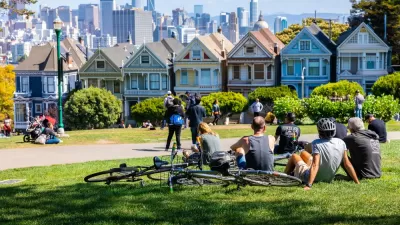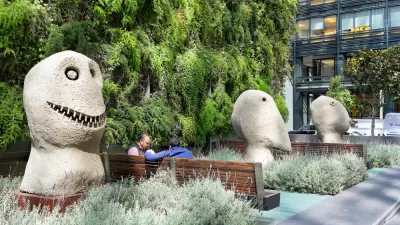San Francisco's 1985 downtown plan required large new office and hotel developments to incorporate public spaces, but the city is only now updating the requirements and reinforcing the initial goal of opening up privately owned public spaces (POPOS).
"Certainly some developers and building owners embraced the spirit of the downtown plan and looked at making this an amazing amenity and feature on their site," said AnMarie Rodgers, the city's manager of legislative affairs. "But I think it's been a struggle since this requirement was put in place to make sure they are truly public." Buildings that have not complied with the original 1985 plan will now be required to truly open up their POPOS and update signage. The city recently launched a new web tool that maps out the POPOS downtown and provides owners with universal logos to designate the amenities of each space including restrooms, food, and seating. "It should create a branding to get to the question, 'does the public understand what these spaces are?'" added Rodgers. "It should really help people to see it as not just one space, but a network of downtown open spaces."
Under the city's regulation, residents and visitors have every right to be in a POPOS whether or not they work in the buildings or buy food from the on-premise restaurants. Some building owners complied with the 1985 plan, but tried to maintain their exclusivity with hard-to-read signage. Others didn't even know that they had to make those spaces public at all. Emily Badger says, "San Franciscans would be forgiven for not quite understanding the whole concept, even 25 years after the creation of the downtown plan. We're generally programmed in any city to feel like trespassers in office buildings where we have no business, or hotels where we have no room." She concludes, "The idea now is that you shouldn’t have to feel that way, even as you’re enjoying a space that looks more like a private sanctuary than your average public park."
FULL STORY: How to Make Privately Owned Public Spaces Truly Open to the Public

Alabama: Trump Terminates Settlements for Black Communities Harmed By Raw Sewage
Trump deemed the landmark civil rights agreement “illegal DEI and environmental justice policy.”

Study: Maui’s Plan to Convert Vacation Rentals to Long-Term Housing Could Cause Nearly $1 Billion Economic Loss
The plan would reduce visitor accommodation by 25% resulting in 1,900 jobs lost.

Planetizen Federal Action Tracker
A weekly monitor of how Trump’s orders and actions are impacting planners and planning in America.

Wind Energy on the Rise Despite Federal Policy Reversal
The Trump administration is revoking federal support for renewable energy, but demand for new projects continues unabated.

Passengers Flock to Caltrain After Electrification
The new electric trains are running faster and more reliably, leading to strong ridership growth on the Bay Area rail system.

Texas Churches Rally Behind ‘Yes in God’s Back Yard’ Legislation
Religious leaders want the state to reduce zoning regulations to streamline leasing church-owned land to housing developers.
Urban Design for Planners 1: Software Tools
This six-course series explores essential urban design concepts using open source software and equips planners with the tools they need to participate fully in the urban design process.
Planning for Universal Design
Learn the tools for implementing Universal Design in planning regulations.
Caltrans
Smith Gee Studio
Institute for Housing and Urban Development Studies (IHS)
City of Grandview
Harvard GSD Executive Education
Toledo-Lucas County Plan Commissions
Salt Lake City
NYU Wagner Graduate School of Public Service




























